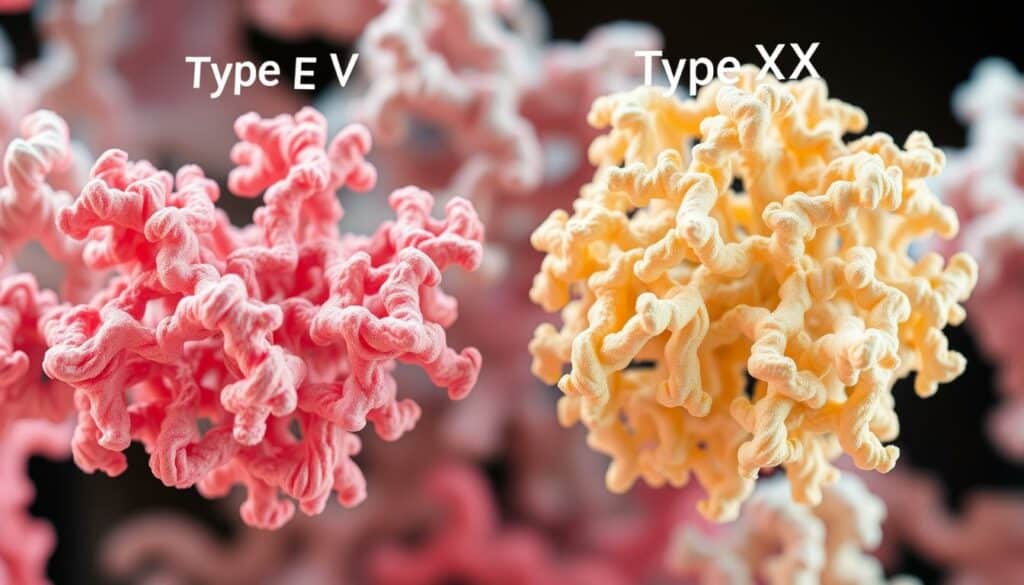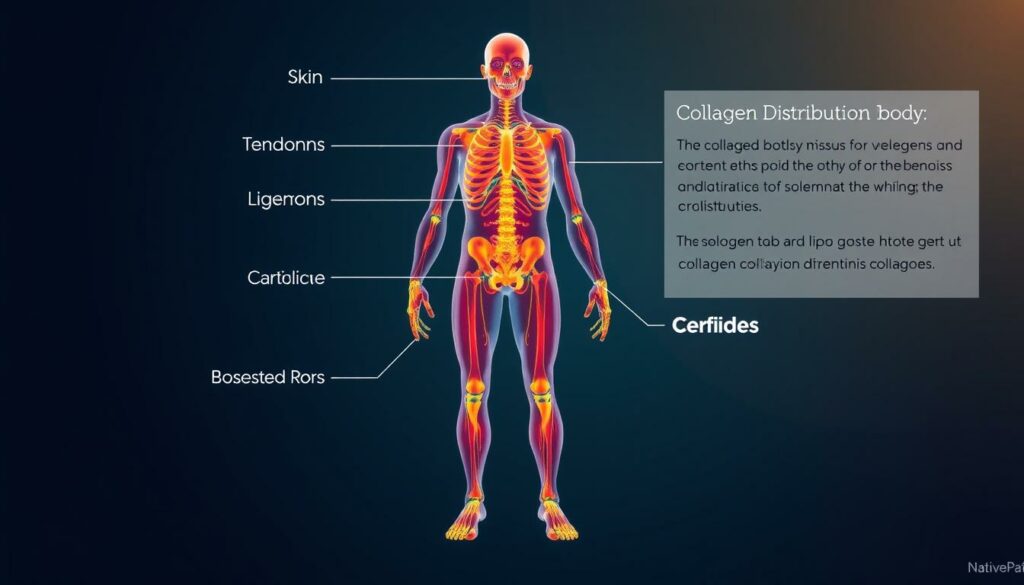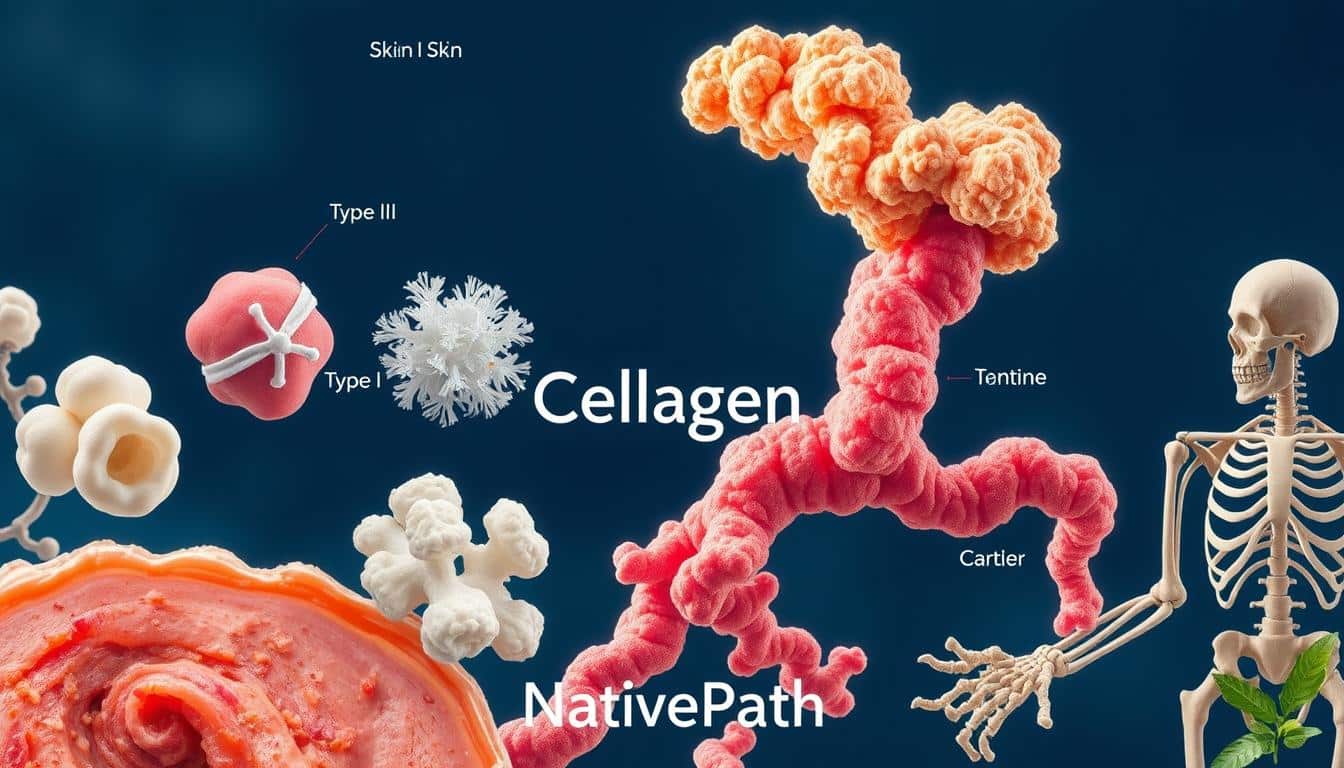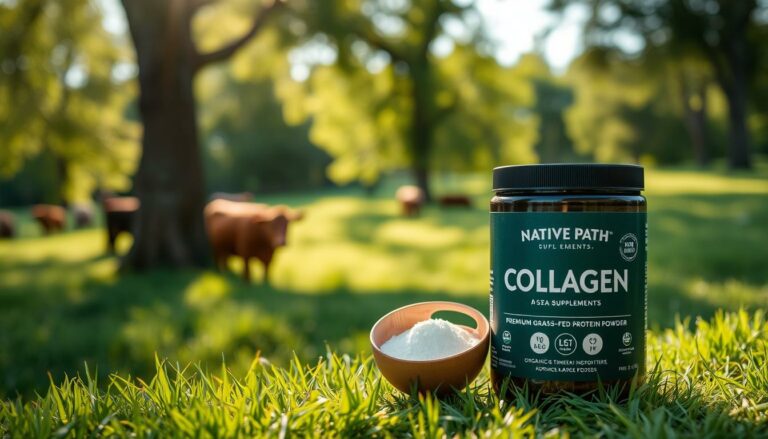Understanding Different Collagen Types: A Complete Guide
Ever wish for the fountain of youth? We can’t turn back time, but we have something close: collagen. This protein is not just a trend; it’s key to our bodies. It helps our skin stay tight and our bones strong.
As we age, our bodies make less collagen. This starts when we’re in our 30s. Less collagen means more wrinkles and aching joints. But, knowing about collagen types can help us stay healthy and beautiful.
Collagen isn’t just one protein; it’s a family. Each type has its own job. Type I keeps our skin firm, while Type II supports our cartilage. Learning about collagen types helps us care for our skin, joints, and health.
Curious about collagen benefits? Want to boost your body’s collagen? This guide is your key to understanding this important protein. Let’s explore how collagen can improve our health and looks.
Key Takeaways
- Collagen production decreases by 1-2% annually after age 30
- There are multiple types of collagen, each serving unique functions
- Collagen supports skin elasticity, joint health, and bone strength
- Understanding collagen types can help target specific health goals
- Supplementation and diet can help maintain collagen levels
- Visible results from collagen supplementation can appear in 4-6 weeks
What is Collagen and Why is it Important?
Collagen is a key protein in our bodies. It makes up about 30% of our total proteins. It’s like the glue that keeps our body together.
The Role of Collagen in the Body
Collagen does more than just make us look good. It’s found in many parts of our body:
- Type I: Most abundant, found in skin, tendons, and bones
- Type II: Primarily in cartilage
- Type III: In muscles, blood vessels, and organs
These types help our tissues stay strong. Collagen is made of amino acids like glycine and proline. It forms a special structure.
How Collagen Supports Skin Health
Collagen keeps our skin elastic. As we get older, we make less collagen. This can cause wrinkles and sagging skin.
Studies show that taking collagen supplements can help. They can make our skin more hydrated and elastic. This might make us look younger.
Benefits Beyond Beauty
Collagen is important for more than just our skin. It helps with:
- Joint health: May reduce joint pain and symptoms of osteoarthritis
- Bone strength: Studies show positive impacts on bone mineral density
- Wound healing: Can speed up healing of pressure ulcers and skin wounds
Research also suggests collagen supplements can improve sleep and brain function. While it’s not a magic cure, collagen is vital for our health.
The Different Types of Collagen
Collagen types are key to our body’s health. Let’s look at the main types and what they do for us.
Overview of the Major Types
Scientists found 28 collagen types, but three are the most common. These three are the main supporters of our body.
| Collagen Type | Location | Function |
|---|---|---|
| Type I | Skin, bones, tendons | Provides strength and structure |
| Type II | Cartilage | Supports joint health |
| Type III | Skin, blood vessels, organs | Enhances tissue repair |
Type I: The Most Abundant
Type I collagen is everywhere, making up 90% of our collagen. It’s in our skin, bones, and connective tissues. This protein keeps our skin tight, bones strong, and tendons firm.
Type II: Cartilage and Joint Support
Type II collagen helps our joints. It’s in cartilage and makes our joints move smoothly. It’s great for those with joint pain or arthritis.
“Collagen is the fountain of youth we’ve been searching for. It’s not mythical – it’s backed by science.”
Knowing about collagen types helps us choose better for our health. Eating right or taking supplements can make our skin better, bones stronger, and joints more flexible.
Type III Collagen: The Supportive Partner

Type III collagen is key for our body’s structure and healing. It works with Type I collagen to keep our skin elastic and support organs.
How Type III Works with Type I
Type III collagen teams up with Type I in our skin, blood vessels, and organs. Together, they offer support and flexibility. As we get older, our collagen levels drop, causing wrinkles and softer skin.
Importance in Wound Healing
Type III collagen is a superstar in healing wounds and repairing tissues. It’s very important when we’re growing, recovering, or healing from injuries. For those getting over surgeries or injuries, Type III collagen is a big help.
| Collagen Type | Primary Function | Location |
|---|---|---|
| Type I | Structural support | Skin, bones, tendons |
| Type III | Wound healing, tissue repair | Skin, blood vessels, organs |
Our bodies make Type III collagen naturally. But, supplements can increase its levels. Marine Collagen Peptides, at $39 for 7.8 oz, are full of Type I and III collagen. They help our skin, hair, nails, bones, and joints, as many customers have noticed.
“Marine Collagen Peptides have been a game-changer for my skin and joint health. I’ve noticed significant improvements in just a few weeks!” – Sarah, verified customer
To keep collagen levels up, eating right and using supplements is smart. Starting in our 30s, our collagen production goes down by 1-2% each year. So, taking care of ourselves early on is key for staying healthy and full of life.
Type IV Collagen: The Basement Membrane
Type IV collagen is very important in our bodies. It makes up the basement membranes. These are thin layers that separate tissues.
These membranes act like filters. They control what moves between different parts of our organs.
Functionality in Cellular Support
The basement membrane, full of Type IV collagen, supports cells. It helps them stick together and stay in place. This is very important in organs like the kidneys.
Studies show Type IV collagen works with cell surface proteins called integrins. These interactions help cells stick and talk to each other. For example, in rat kidneys, all three types of glomerular cells have receptors that bind to the collagen matrix.
Role in Organ Health
Type IV collagen is key for organ health. It keeps the structure of various organs, making sure they work right. In the kidneys, it’s part of the filtration system that cleans our blood.
If Type IV collagen goes wrong, serious health problems can happen. Alport Syndrome is one such condition. It affects about 1 in 5,000 to 10,000 people worldwide and makes up 3% of chronic kidney disease in kids.
| Alport Syndrome Type | Affected Gene | Inheritance Pattern |
|---|---|---|
| X-linked | COL4A5 | Most common, severe in males |
| Autosomal recessive | COL4A3 or COL4A4 | Severe, two faulty copies |
| Autosomal dominant | COL4A3 or COL4A4 | Milder, one faulty copy |
Knowing how Type IV collagen works in the basement membrane and organ health is important. It’s not just about looks; it’s about keeping our bodies working right.
Type V and Type X Collagen: The Lesser-Known Types

Type I collagen gets a lot of attention. But Type V collagen and Type X are also very important. They show how collagen helps keep us healthy.
Type V’s Role in Hair and Placenta
Type V collagen is found in hair, corneas, and the placenta. It helps make tissues strong. It works with Type I collagen to make strong fibers in our skin, tendons, and bones.
Type X in Bone Health
Type X collagen is key for our bones. It helps bones grow and stay strong. As we get older, our bodies make less collagen, which can weaken our bones.
Collagen supplements may help prevent bone loss and reduce the risk of osteoporosis and fractures.
Knowing about these collagen types is important. Supplements can help, but eating right is best. A diet full of protein and vitamin C helps our bodies make collagen naturally.
| Collagen Type | Location | Function |
|---|---|---|
| Type V | Hair, Corneas, Placenta | Supports smaller fibrils, Tissue strength |
| Type X | Bones | Bone formation, Maintains bone density |
Where is Collagen Found in the Body?

Collagen is the most common protein in our bodies. It helps keep us healthy and full of life. As we get older, our bodies make less collagen. This leads to signs of aging.
Knowing where collagen is in our bodies helps us focus on wellness. It’s about targeting areas that need it most.
Common Sources of Collagen
Collagen is everywhere in our body, mostly in connective tissues. These collagen sources include:
- Skin (75% of skin’s dry weight)
- Bones and tendons
- Cartilage
- Blood vessels
- Organs
- Muscles
Collagen in Connective Tissues
Connective tissues are where collagen lives. They give structure, support, and strength to our body. Each tissue has its own type of collagen.
| Tissue Type | Primary Collagen Type | Function |
|---|---|---|
| Skin | Type I | Provides elasticity and strength |
| Cartilage | Type II | Cushions joints |
| Blood vessels | Type III | Supports vessel structure |
| Basement membranes | Type IV | Filtration barrier |
Knowing where collagen is helps us focus on health. Eating foods rich in collagen or taking supplements can help. This supports our body’s collagen production and keeps us well.
“Collagen is like the fountain of youth for our bodies. It reduces wrinkles, eases joint pain, strengthens hair and nails, and supports bone density. The only downside? Starting in our 30s, we produce 1%-2% less collagen protein per year.”
Food Sources that Boost Collagen Production
Collagen is key for our skin’s health. It starts to go down at age 25. But, nature has many foods rich in collagen to keep your skin and joints healthy. Let’s look at some great options to boost collagen in your body.
Bone Broth: A Nutritional Powerhouse
Bone broth is a top choice for collagen. It’s made by cooking animal bones slowly. It’s full of collagen, gelatin, amino acids, and minerals. This broth is good for your joints and might help with pain.
Vitamin C-Rich Foods
Vitamin C is important for making collagen. Oranges, lemons, and grapefruits are full of it. Spinach and kale are also good. They have vitamin C and antioxidants that protect collagen.
Other foods that help with collagen include:
- Oily fish (salmon, mackerel, tuna) – rich in marine collagen
- Chicken – the skin and connective tissues are great
- Nuts and seeds – almonds, walnuts, sunflower seeds
- Garlic – boosts collagen and fights inflammation
- Tomatoes – protect collagen from UV damage
Eating these collagen-rich foods can help your body make more collagen. A good diet and skincare routine can keep your skin young and your joints strong for a long time.
“Let food be thy medicine and medicine be thy food.” – Hippocrates
Supplements: Do They Help with Collagen Types?
Collagen supplements are popular for looking young. Our bodies make less collagen as we get older. This can hurt our skin, joints, and bones. But do supplements really help?
Types of Collagen Supplements Available
There are many types of collagen supplements. Here’s what you can find:
- Powders: Easy to mix into drinks or food
- Capsules: Convenient for on-the-go consumption
- Liquids: Ready-to-drink options
Hydrolyzed collagen and collagen peptides are favorites because they work well. Marine collagen is good for the skin. Bovine collagen helps with joints and bones.
The Science Behind Collagen Absorption
Studies say collagen supplements can be good for you. How well they work depends on the type, how much you take, and your health. They can help with skin, joints, and muscles.
| Collagen Type | Primary Benefits | Recommended For |
|---|---|---|
| Type I | Skin elasticity, hair strength | Anti-aging, beauty |
| Type II | Joint support, cartilage health | Athletes, arthritis sufferers |
| Type III | Skin firmness, cardiovascular health | Overall wellness |
Collagen supplements can be good for a healthy life. But, they’re not a magic fix. Always talk to a doctor before trying new supplements.
Collagen and Aging: What You Need to Know
As we get older, our bodies change a lot. One big change is less collagen production, starting in our 30s. Collagen is important for skin, joints, and body structure.
How Aging Affects Collagen Levels
Collagen is a big part of our bodies. It helps with muscles, tendons, bones, and skin. But, as we age, we make less collagen each year.
Things outside of us can also hurt collagen. UV rays, smoking, bad food, and pollution can break it down. Knowing this helps us keep our collagen healthy as we age.
Tips for Maintaining Collagen Health
We can’t stop aging, but we can help our collagen:
- Protect skin from sun damage
- Eat foods that help collagen
- Drink lots of water
- Move your body
- Don’t smoke
Good foods for collagen are bone broth, fish, chicken, and eggs. If diet isn’t enough, supplements can help. They can stop bone loss, ease joint pain, and make skin better.
“Collagen is like the fountain of youth for our bodies. It’s not mythical – it’s scientifically proven to reduce wrinkles, ease joint pain, and support bone density.”
Keeping collagen healthy is a long-term job. It might take weeks or months to see changes from food or supplements. By knowing how aging affects collagen and taking action, we can help our bodies for years.
Conclusion: Embracing Collagen for Overall Wellness
Collagen is very important for our bodies. It helps our skin stay firm and our joints move smoothly. As we get older, our bodies make less collagen. So, we need to eat right, live healthy, and use supplements to help.
Summarizing the Benefits
Collagen is more than just for beauty. It’s the main protein in our bodies. It keeps our skin tight, joints flexible, and bones strong.
Studies show collagen supplements can make our skin look better and our joints feel better. These benefits help us stay active and healthy as we get older.
Final Thoughts on Collagen Types
Knowing about different collagen types helps us meet our health goals. Type I collagen is in our skin, bones, and connective tissues. Type II is good for our joints. Type III works with Type I for our skin’s elasticity.
By using bone broth, eating foods rich in vitamin C, or taking supplements, we can support our health. Embracing collagen is a big step towards feeling our best.




